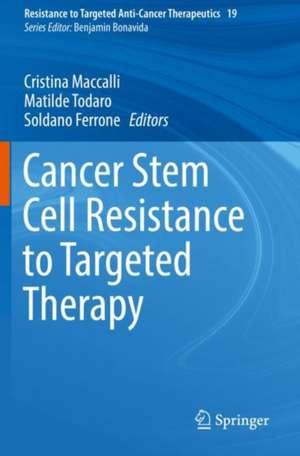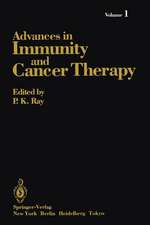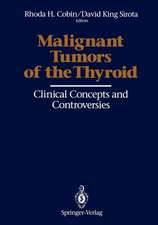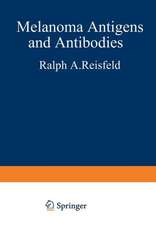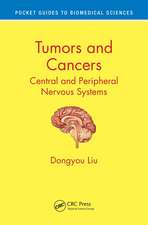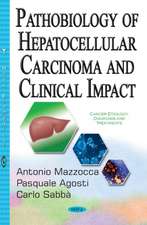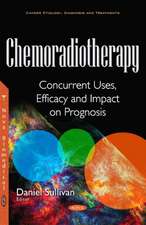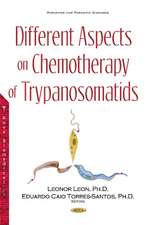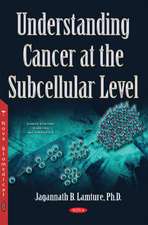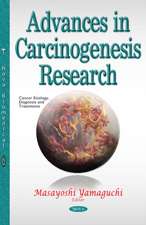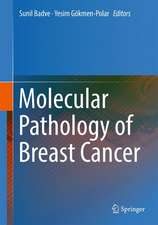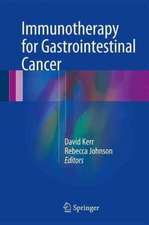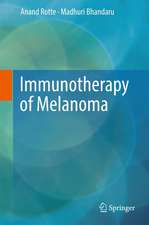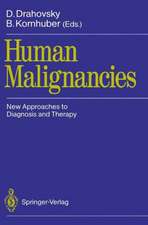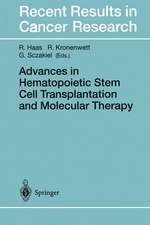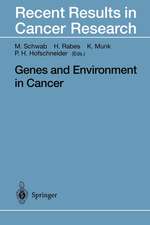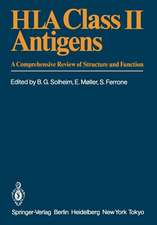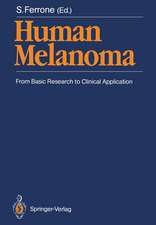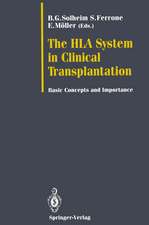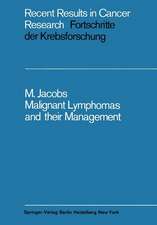Cancer Stem Cell Resistance to Targeted Therapy: Resistance to Targeted Anti-Cancer Therapeutics, cartea 19
Editat de Cristina Maccalli, Matilde Todaro, Soldano Ferroneen Limba Engleză Paperback – 14 aug 2020
This book is conceived for a broad audience, including students, teachers, scientific experts. The critical revision of available results in terms of immunological profile of CSCs/CICs and the efficacy in targeting these cells by immunological approaches, results in a comprehensive and up to date recapitulation of the field and provides interesting suggestions on how to focus future investigations in order to assess the role of CSCs/CICs as prognostic and predictive biomarkers of responsiveness to therapies for cancer patients.
| Toate formatele și edițiile | Preț | Express |
|---|---|---|
| Paperback (1) | 714.83 lei 6-8 săpt. | |
| Springer International Publishing – 14 aug 2020 | 714.83 lei 6-8 săpt. | |
| Hardback (1) | 721.77 lei 6-8 săpt. | |
| Springer International Publishing – 17 iun 2019 | 721.77 lei 6-8 săpt. |
Din seria Resistance to Targeted Anti-Cancer Therapeutics
- 5%
 Preț: 718.10 lei
Preț: 718.10 lei - 5%
 Preț: 1107.21 lei
Preț: 1107.21 lei - 5%
 Preț: 1096.10 lei
Preț: 1096.10 lei - 5%
 Preț: 1100.30 lei
Preț: 1100.30 lei - 5%
 Preț: 1093.35 lei
Preț: 1093.35 lei - 5%
 Preț: 1103.22 lei
Preț: 1103.22 lei - 5%
 Preț: 1093.88 lei
Preț: 1093.88 lei - 5%
 Preț: 1099.35 lei
Preț: 1099.35 lei - 5%
 Preț: 1096.10 lei
Preț: 1096.10 lei - 5%
 Preț: 841.00 lei
Preț: 841.00 lei - 5%
 Preț: 715.91 lei
Preț: 715.91 lei - 5%
 Preț: 1093.88 lei
Preț: 1093.88 lei - 5%
 Preț: 712.25 lei
Preț: 712.25 lei - 5%
 Preț: 1024.59 lei
Preț: 1024.59 lei - 5%
 Preț: 723.57 lei
Preț: 723.57 lei - 5%
 Preț: 721.19 lei
Preț: 721.19 lei - 5%
 Preț: 721.19 lei
Preț: 721.19 lei - 5%
 Preț: 726.68 lei
Preț: 726.68 lei - 5%
 Preț: 723.21 lei
Preț: 723.21 lei - 5%
 Preț: 717.73 lei
Preț: 717.73 lei
Preț: 714.83 lei
Preț vechi: 752.45 lei
-5% Nou
Puncte Express: 1072
Preț estimativ în valută:
136.78€ • 142.82$ • 112.95£
136.78€ • 142.82$ • 112.95£
Carte tipărită la comandă
Livrare economică 15-29 aprilie
Preluare comenzi: 021 569.72.76
Specificații
ISBN-13: 9783030166267
ISBN-10: 3030166260
Pagini: 256
Ilustrații: XIX, 256 p. 21 illus. in color.
Dimensiuni: 155 x 235 mm
Greutate: 0.4 kg
Ediția:1st ed. 2019
Editura: Springer International Publishing
Colecția Springer
Seria Resistance to Targeted Anti-Cancer Therapeutics
Locul publicării:Cham, Switzerland
ISBN-10: 3030166260
Pagini: 256
Ilustrații: XIX, 256 p. 21 illus. in color.
Dimensiuni: 155 x 235 mm
Greutate: 0.4 kg
Ediția:1st ed. 2019
Editura: Springer International Publishing
Colecția Springer
Seria Resistance to Targeted Anti-Cancer Therapeutics
Locul publicării:Cham, Switzerland
Cuprins
Cancer Stem Cells: from birth to death.- A Cancer Stem Cell Perspective on Minimal Residual Disease in Solid Malignancies.- Cancer Stem Cells in Lung Cancer: Roots of Drug Resistance and Targets for Novel Therapeutic Strategies.- Overexpression of YY1 Regulates the Resistance of Cancer Stem Cells: Targeting YY1.- Cancer Stem Cell Challenges in Melanoma Characterization and Treatment.- Harnessing the immune system to target cancer cells.- Targeting leukemia stem cells and the immunological bone marrow microenvironment.- Crosstalk Between Prostate Cancer Stem Cells and Immune Cells: Implications for Tumor Progression and Resistance to Immunotherapy.- Cancer stem cells: the players of immune evasion from immunotherapy.- Index.
Notă biografică
Dr. Cristina Maccalli is a Staff Scientist at the Division of Translational Medicine, Sidra Medicine, Doha, Qatar.
Dr. Maccalli obtained a Master’s Degree in Biological Sciences and a Ph.D. in Applied Genetics at the University of Milan, Italy. Her research interest lies in the area of immunology, tumor immunology and immunotherapy, with main focus on the functional characterization of immune responses, cancer stem cells and on the identification of biomarkers predictive of patients’ clinical outcome and responsiveness to therapies. She carried out her post-doctoral research programs at the National Cancer Institute in Milan, Italy and, then, at the Surgery Branch, National Cancer Institute, NIH, Bethesda, MD, USA.
Most recently, Dr. Maccalli joined the Translational Medicine Department at Sidra Medical and Research Center, Doha, Qatar, where she is involved in development of innovative studies in the context of biomarker discovery and immunotherapy. Her principle project areas are 1. the generation of chimeric receptor engineered T cells to target hematological malignancies; 2. The molecular and functional characterization of cancer stem cells isolated from colorectal and breast cancer patients and 3. the identification of biomarkers predictive of clinical outcome of patients with inflammatory bowel disease.
Dr. Matilde Todaro is currently an Associate Professor, SSD MED/04, General Pathology at the University of Palermo. She is the Medical Director and Head of Endocrinology and Metabolic Disease, Intensive Metabolic Care Unit, Institute of Clinical Medicine, University of Palermo. She is also responsible for the Onco-Haematological diagnostics laboratory, Central Laboratory of Advanced Diagnosis and Biomedical Research (CLADIBIOR), University of Palermo.
Dr. Todaro has contributed to cancer research by developing new anticancer therapies. Recently, her interest has been focused on the most promising and innovative biomedical research, namely, cancer stem cells and their role in the onset and progression of breast cancer. The publication of many of her studies in prestigious journals has granted her inclusion in a national and international research network.
Dr. Todaro’s group was one of the first to isolate and propagate cancer stem cells from tumors of epithelial origin. This advanced contribution to the scientific community led her to establish collaborations with prestigious international pharmaceutical companies such as Eli Lilly, Roche, Pfizer, Tristar, Merck and Trevigen, who have financed part of her research aimed at the development of therapies against cancer stem cells.
She has supervised and mentored many graduate students and she was the tutor in charge of several post graduate and post-doctoral fellows.
Recently, Dr. Todaro’s scientific activity is aimed at studying the biology of breast cancer in order to identify new molecular targets that facilitate early diagnosis and to improve the treatment options against breast cancer, that nowadays are restricted to conventional therapies.
Dr. Soldano Ferrone joined the Massachusetts General Hospital, Harvard Medical School as Professor in the Department of Surgery. He has held faculty positions at many Academic Institutions in the United States and at the Medical School of the University of Milan, Milan, Italy.
His research program focused on the development of antibody-based immunotherapeutic strategies for the treatment of solid tumors and on the characterization of the role of defects of HLA class I antigen processing machinery as an escape mechanism utilized by tumor cells to avoid immune recognition and destruction. These studies are greatly facilitated by the large panel of HLA antigen- and human tumor antigen-specific monoclonal antibodies he has developed and shared with the scientific community over the years.
He has described the results of his studies in more than 600 papers published in peer reviewed journals. He has been the editor of 14 books and the guest editor of 5 special issues of oncology journals.
Dr. Ferrone has received many awards and honors. For the last 30 years he has been the member of many review committees including NIH Study Sections, and of the editorial boards of many scientific journals. He is the member of several external scientific boards.
Dr. Maccalli obtained a Master’s Degree in Biological Sciences and a Ph.D. in Applied Genetics at the University of Milan, Italy. Her research interest lies in the area of immunology, tumor immunology and immunotherapy, with main focus on the functional characterization of immune responses, cancer stem cells and on the identification of biomarkers predictive of patients’ clinical outcome and responsiveness to therapies. She carried out her post-doctoral research programs at the National Cancer Institute in Milan, Italy and, then, at the Surgery Branch, National Cancer Institute, NIH, Bethesda, MD, USA.
Most recently, Dr. Maccalli joined the Translational Medicine Department at Sidra Medical and Research Center, Doha, Qatar, where she is involved in development of innovative studies in the context of biomarker discovery and immunotherapy. Her principle project areas are 1. the generation of chimeric receptor engineered T cells to target hematological malignancies; 2. The molecular and functional characterization of cancer stem cells isolated from colorectal and breast cancer patients and 3. the identification of biomarkers predictive of clinical outcome of patients with inflammatory bowel disease.
Dr. Matilde Todaro is currently an Associate Professor, SSD MED/04, General Pathology at the University of Palermo. She is the Medical Director and Head of Endocrinology and Metabolic Disease, Intensive Metabolic Care Unit, Institute of Clinical Medicine, University of Palermo. She is also responsible for the Onco-Haematological diagnostics laboratory, Central Laboratory of Advanced Diagnosis and Biomedical Research (CLADIBIOR), University of Palermo.
Dr. Todaro has contributed to cancer research by developing new anticancer therapies. Recently, her interest has been focused on the most promising and innovative biomedical research, namely, cancer stem cells and their role in the onset and progression of breast cancer. The publication of many of her studies in prestigious journals has granted her inclusion in a national and international research network.
Dr. Todaro’s group was one of the first to isolate and propagate cancer stem cells from tumors of epithelial origin. This advanced contribution to the scientific community led her to establish collaborations with prestigious international pharmaceutical companies such as Eli Lilly, Roche, Pfizer, Tristar, Merck and Trevigen, who have financed part of her research aimed at the development of therapies against cancer stem cells.
She has supervised and mentored many graduate students and she was the tutor in charge of several post graduate and post-doctoral fellows.
Recently, Dr. Todaro’s scientific activity is aimed at studying the biology of breast cancer in order to identify new molecular targets that facilitate early diagnosis and to improve the treatment options against breast cancer, that nowadays are restricted to conventional therapies.
Dr. Soldano Ferrone joined the Massachusetts General Hospital, Harvard Medical School as Professor in the Department of Surgery. He has held faculty positions at many Academic Institutions in the United States and at the Medical School of the University of Milan, Milan, Italy.
His research program focused on the development of antibody-based immunotherapeutic strategies for the treatment of solid tumors and on the characterization of the role of defects of HLA class I antigen processing machinery as an escape mechanism utilized by tumor cells to avoid immune recognition and destruction. These studies are greatly facilitated by the large panel of HLA antigen- and human tumor antigen-specific monoclonal antibodies he has developed and shared with the scientific community over the years.
He has described the results of his studies in more than 600 papers published in peer reviewed journals. He has been the editor of 14 books and the guest editor of 5 special issues of oncology journals.
Dr. Ferrone has received many awards and honors. For the last 30 years he has been the member of many review committees including NIH Study Sections, and of the editorial boards of many scientific journals. He is the member of several external scientific boards.
Textul de pe ultima copertă
This book represents an updated summary of the state of the art of the characterization of cancer stem cell/cancer initiating cell (CSC/CIC) properties. Experts provide an overview of the definition and biological properties of CSCs/CICs as well as the role of these cells in determining the resistance to standard and immune-based therapies. It also discusses limitations in the achievement of a definitive biological characterization of CSCs/CICs due to their high extent of plasticity and heterogeneity that is also mutually driven by the interaction of these cells with the tumor microenvironment. The limitations in targeting CSCs/CICs with immunotherapy are also explained together with explorative combination approaches that could increase the susceptibility of these cells to the recognition by immune cells.
This book is conceived for a broad audience, including students, teachers, scientific experts. The critical revision of available results in terms of immunologicalprofile of CSCs/CICs and the efficacy in targeting these cells by immunological approaches, results in a comprehensive and up to date recapitulation of the field and provides interesting suggestions on how to focus future investigations in order to assess the role of CSCs/CICs as prognostic and predictive biomarkers of responsiveness to therapies for cancer patients.
This book is conceived for a broad audience, including students, teachers, scientific experts. The critical revision of available results in terms of immunologicalprofile of CSCs/CICs and the efficacy in targeting these cells by immunological approaches, results in a comprehensive and up to date recapitulation of the field and provides interesting suggestions on how to focus future investigations in order to assess the role of CSCs/CICs as prognostic and predictive biomarkers of responsiveness to therapies for cancer patients.
Caracteristici
Presents ideas to focus future investigations that will assess the role of CSCs/CICs as prognostic and predictive biomarkers Focuses on the clinical implications and challenges of targeting cancer stem cells with immunotherapy Provides an overview of the definition and biological properties of CSCs/CICs
